Posted by: Francis Koster Published: October 19, 2020
How Corporate Food Labels Mislead You
I have powerful memories of my mom, the mother of six, counting money at the kitchen table, sighing and scratching items from her shopping list because she realized we could not afford them.
Sometimes she cried.
While shopping, she taught me how to look out for overpriced items. If her suspicions were aroused, she would do something like take a five-pound bag of potatoes over to the meat department and ask them to weigh it. She was usually correct and they would have to reduce the price. After a series of such events, we switched to another market.
All behavior has consequences.
She would push the baby stroller and I the shopping cart. I loved eggs at breakfast or hard-boiled in my school lunch, and I would pepper her with questions: “How much less should a dozen small eggs cost compared to a dozen large eggs?” “What does “large” mean, anyway?” "Where are all the little eggs?" “Why are some eggs more expensive than others?” Bless her soul.
Those questions are as relevant today as they were 70 years ago – but for different reasons. Back then eggs were produced on family farms. Now they are produced in Concentrated Animal Feeding Operations (CAFOs) where tens of thousands of hens live on an egg assembly line. North Carolina is the eighth largest egg-producing state[1] and I live here, so this is personal. I hope my mom is watching.
There is about one egg-laying chicken for every citizen in America.[2] Let’s call your chicken Hannah – she provides you with around 280 eggs a year for breakfasts and baked goods.[3] Why did you buy her eggs rather than another chickens? Mostly because of the labels on the carton.
You may have seen egg cartons with words like “Natural” “Humane” “Farm Fresh” “Pasture Raised” “Hormones Free” and “Vegetarian Diet”. None of these have any legally binding meaning and are just misleading marketing slogans done to increase sales. [4],[5],[6],[7] You are being duped.[8]
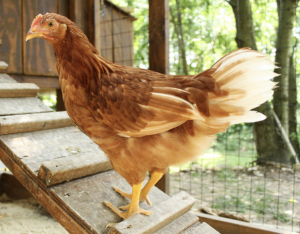 Other misleading but legal words on egg cartons are “Cage Free” or “Free Range”. These words actually have industry-accepted definitions. I bet you will not like them.
Other misleading but legal words on egg cartons are “Cage Free” or “Free Range”. These words actually have industry-accepted definitions. I bet you will not like them.
Let’s start with the words “Cage Free”. In order to understand this advertising slogan, you have to know what a “Cage” is, right? In the egg industry, they are called “Battery Cages”, and have a legal definition of a wire box with 67 square inches of floor space – just about the size of an iPad Air.[9]
 So here is a little exercise for you to do: Imagine hugging your chicken, Hannah. Now, in your imagination, place Hannah in that iPad sized cage for the rest of her life.
So here is a little exercise for you to do: Imagine hugging your chicken, Hannah. Now, in your imagination, place Hannah in that iPad sized cage for the rest of her life.
About three-quarters of all eggs produced in America are laid by Mama Chickens like Hannah living in cages that small.[10]
If you look at this example below, you will notice that no words appear referencing cages on the cartons that contain eggs produced that way.
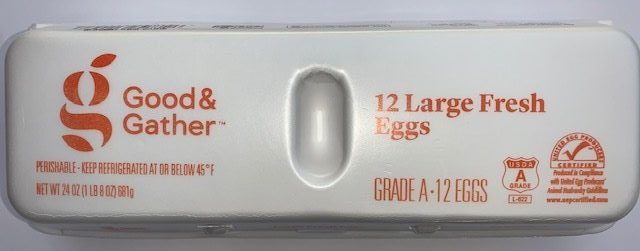
Now that you understand what “Caged” means, you become vulnerable to the next misleading marketing label – “Cage Free”. Basically, what this means is the walls between the thousands of cages are removed, and the Mama Chickens like Hannah can roam around inside the huge sheet metal industrial barn to get access to food and water. She gets one square foot of space which she has to defend from all the other Mama Hens.[11] See how this is celebrated in the packaging below.
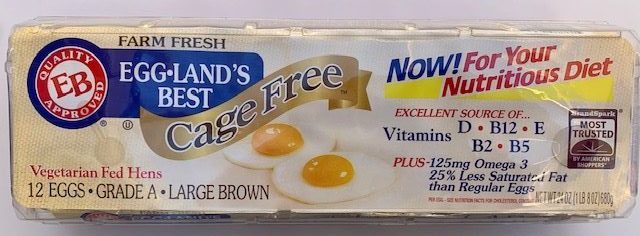
The next adventure in corporate communications are the emotionally inspiring words “Free Range”. I bet you think this means that the chickens live outside, happily scratching for bugs while basking in the sunshine. Wrong. Under industry guidelines, Hannah is supposed to get access to a door to the outside so she can roam about. There is no requirement that she actually goes outside, and because of the design of most factory farms, most hens do not. They are free to range inside a one square foot space inside a metal shed. You can see an example of this kind of branding below.
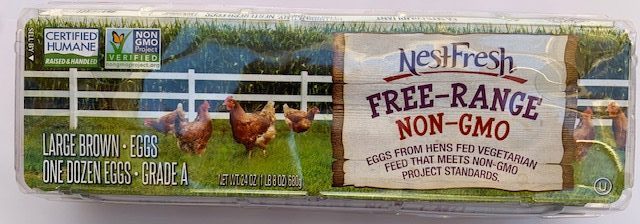
The only term that has a binding federal legal definition is “Organic”. This means that all the food Hannah eats (including the grass in the pasture if she goes outside) comes from plants grown without chemicals or pesticides. [12]
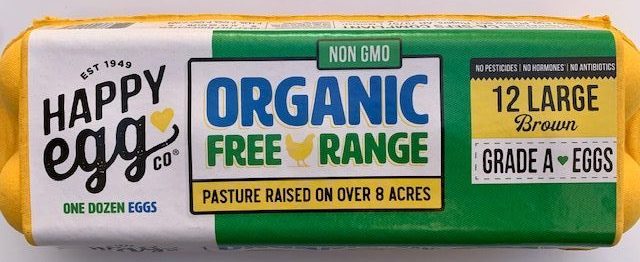
There are things every family can do to address this mess. Start by buying organic eggs. Tell your neighbors about how the egg cartons contain false or misleading labels. Contact your state elected officials and ask them to join the state governments of seven other states (Colorado, Michigan, Oregon, Washington, Massachusetts, California and Rhode Island)[13] to get laws passed to make battery cages illegal, and insist on the legal test of “Is it the truth, the whole truth, and nothing but the truth?” to food labels.
If the citizens of North Carolina were to do these things, we will bring truth to the marketplace, and create a healthier situation for our families and 15,000,000 North Carolina hens.[14]
Authored by Francis Koster Ed. D.
[1] https://unitedegg.com/facts-stats/
[2] https://www.farmsanctuary.org/chickens/
[3] https://www.farmsanctuary.org/chickens/
[4] https://www.cookinglight.com/eating-smart/nutrition-101/egg-labels-guide
[5] https://aldf.org/article/egg-labeling-regulations-guide/
[7] https://aldf.org/article/egg-labeling-regulations-guide/
[9] https://www.lifewire.com/how-big-is-ipad-weight-1994316
[10] https://unitedegg.com/facts-stats/
[11] https://aldf.org/article/egg-labeling-regulations-guide/
[12] https://www.usda.gov/media/blog/2012/03/22/organic-101-what-usda-organic-label-means
[14] https://www.statista.com/statistics/196080/total-number-of-laying-hens-by-top-10-us-states/